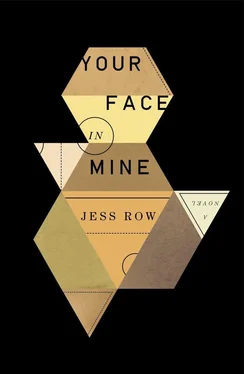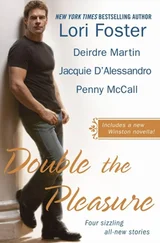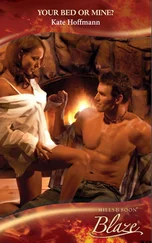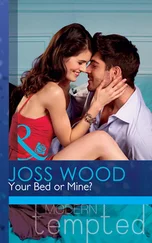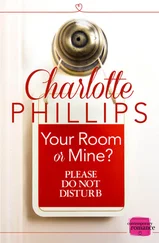I mean, the point is, it was a family. Not in the nuclear sense; in the original sense. The elastic sense. No matter what time of day, somebody would be home, the TV would be on, and something would be on the stove. No one once questioned my being there. I could go on for hours. I remember that house better than my own. The orange shag rug in the living room. Herbs in pots around the windowsills. There was an enormous Ali — Frazier poster hanging up in the hall, and another one in the dining room — Ali knocking out Sonny Liston. And a couple of Benin masks, the ones with the enormous foreheads and tiny eyes. We used to do our homework at the dining table, and Willie would go up to the masks and pretend they were whispering the answers in his ear.
My father was relieved by this arrangement. To say the least. I would call him from their phone, and say, I’m staying at Willie’s till bedtime, and he would say, good, because there’s nothing in the fridge. His mother — Rashida was her name — she even cut my hair, you believe that? The barber’s chair was right there, next to the sink; you tilted your head back for shampooing and then swung right around to the mirror on the opposite wall. I wanted it cut super-close, just like Willie’s, and she did her best. Kind of a Roman style, is how it came out, slicked down with pomade. Wish I had a picture. That was how I wore my hair all those years. Christ, I mean, you have to understand, I must have had dinner there two or three nights a week. How else can I explain it? It wasn’t just that I was happy. It was that I felt human, as if for the first time. Let me refine that statement. I felt part of the human world. And so when Willie told me it was okay, because I would turn black one day, too, I wanted to believe him. Part of me did believe him.
So that’s the story of my happy childhood on Greenmount Ave. An accidentally happy childhood. Until I got shot.
There’s still a trace of a scar. It was a graze, a flesh wound. Walking home from school. Guy opened up on his girlfriend right across the sidewalk, in broad daylight; killed her, her new boyfriend, I guess he was, and Dwayne Pierce. Dwayne was in third grade with me. I got caught with a ricochet. My leg was a bloody mess, but I didn’t feel anything. Passed out and woke up in the hospital. After that a social worker came to visit. I’ve no idea why. Maybe the school thought I was too much of a liability, too easy a target? In any case, I was moved in the middle of the year to Roland Park Elementary. Dad objected, believe me. It meant he had to drive me to school. One school is as good as another, he kept saying. A boy should be able to walk to school.
Should I move on? Should I skip ahead, a little? Somehow this seems like the place to do it. My father had AIDS. He died of AIDS. In secret, of course. The way he did everything. It was Enrique, most likely, that gave it to him. Enrique died from it, too, back in Honduras, after he left us. But it could have been any number of people. After Big Love, when we moved back to the city, we went through a time when there was a new guy around the house every month or so. He bragged, in the end, that he never once used a condom with a man. He may have been delusional.
In any case, it was all over fast, because he waited too long. AZT was around; the triple cocktail was nearly on the market; but by the time he bothered to see a doctor he had the full-blown disease and it was too late to start. In a couple of months he lost nearly twenty pounds; then he got pneumonia, in November, November of 1994, and died on New Year’s Day, 1995. He’d only been diagnosed — what was it? — a year and a half.
And who was I? Who was I, then, the day I became an orphan?
I have to stop. That’s a story for another day.
Martin switches the wipers to low against a mild drizzle, a fine mist, brackish with road salt; the residue crusts along the sides of the windshield. Gray-green, featureless April, the woods lining the highway dissolved in fog. Through the car’s open vents I can smell the otherworldly scent of thawing earth.
Didn’t you ever meet my father?
No. I’m sure I didn’t.
Short guy, in tennis whites? You sure? Thinning hair, combed back? Gold stud in the right ear? You never came inside the house, not once?
Tennis whites?
He wore them all the time. They were the closest thing he had to a uniform. He was inordinately proud of his legs.
A moment passes. I’m growing aware, every time he stops speaking, of the particular qualities of silence inside this car. A cushioned, baffled, carefully engineered silence. The engine a low vibration more felt than heard. It’s just new enough to have a new-leather smell, like a shoe store, but there are other, more prominent smells: Aftershave. French roast coffee. Dry cleaning? Is there a discernible smell from the plastic-wrapped package just behind my shoulder — the pressing iron, the steam, the sleek fabric itself exhaling? A teasing childish voice, asking, how did this, and this, and this, come to be ?
Maybe, I say, maybe I should start by saying this: I was really shocked to know about your father. That you never told anyone.
He drains his coffee cup and thunks it back into the cup holder, emphatically.
Are you wondering what to say? he asks. Don’t say anything. Did I give you a chance to care? Is it your fault you never knew what nobody knew? Of course not. He was a gay man in the Seventies and Eighties. Before anybody knew better. He didn’t want anyone to pity him. Pity us, he always said. The catastrophe is general.
Not general to you.
Do you want me to say something I don’t feel?
His BlackBerry, attached to his belt, buzzes and cheeps, a ringtone meant to sound like late-summer crickets. After four rings, as if coming out of a daze, he takes it out, silences it, and tosses it across the dashboard.
Listen, he says, maybe the way to put it is like this. My childhood — this whole story — it’s like its own crazy little bubble, right? An ectoplasm unto itself. That’s how Dad wanted it. And I understood him, and I followed the pattern. At first it was just out of shame. Later, toward the end, it was respect. You know the movie Amadeus ? The part where Mozart dies, and they throw his body into the pauper’s grave, the unmarked grave, and shake a little lime over it, not even a coffin? Dad loved that. Do that , he said. So I did. As close as you could get in the twentieth century. I kept his anonymity. I kept our big secret, whatever it was, exactly. But that’s not the same thing as love. And it’s not the same thing as grief, either. You could call it a habit of extreme privacy. Which I’m trying to break. Slowly.
I think about Robin — how can I not? — Tamika, Sherry, his house and its shiny, unplumbable surfaces, its granite and tile.
Whatever happened to Willie?
To Willie? You really want to know? It all ended in a fight over Legos. We still saw each other, that first year after I left Shabazz. I still ate at his house once or twice a month. Still needed it, to recharge my batteries. And his mother insisted. Stay friends, she always said. No reason you can’t stay friends. She bought us toys to play with together. With what money I don’t know. What was she thinking, buying toys that two little boys always have to share? I wanted to take the castle home to my house to play with, Willie said no, it’s my castle, I shoved him, he shoved me, I cracked my head on the coffee table. That was it. Don’t ever let them tell you only girls are bitter in their grudges. We never talked again. And after that, magically, my old neighborhood — that whole world — sealed itself off from me. When I was home, away from school, I was inside the house. Alone again. How was I supposed to know what a mistake that was?
Читать дальше
